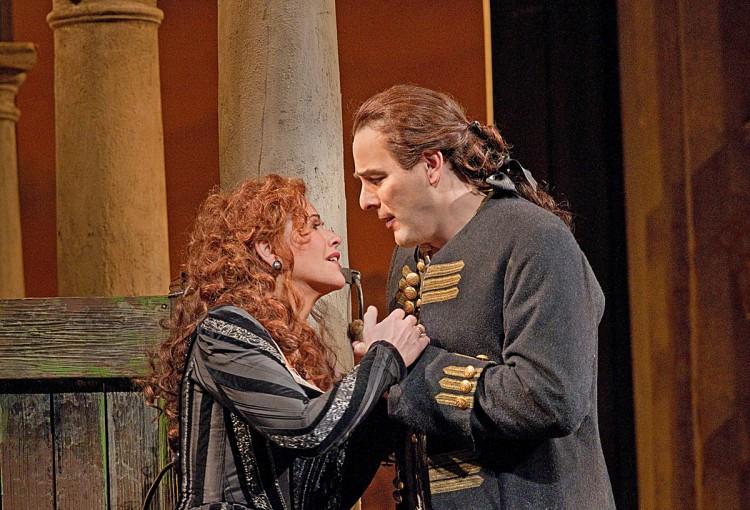NEW YORK—Handel’s 42 operas can best be described as a relentless volley of wonderfully infectious arias, loosely put together by brief recitatives and complicated (and often slightly silly) plots about love and honor, war and betrayal, vice and virtue.
The themes are timeless, the characters well-written and human, yet stylized enough to make Handel’s operas very adaptable for endless scenic reinterpretation—and, of course, the music is absolutely gorgeous.
“Rodelinda” was one of Handel’s biggest hits, both in his own time and after the rediscovery of Handel as an important opera composer (which began in the 1920’s). The Met’s second revival of its 2004 production plays it relatively straight, as far as its set design goes.
Of course, since we’re dealing with a leading opera house with serious resources, it still contains some pretty impressive and elaborate moving stage sets and a live horse, no less. Apart from that, it’s presented as a kind of 18th century romantic period piece, which works very well.
The characters are taken from a 7th century legend and the story is a classical one: A dethroned king, Bertarido, presumed dead, returns in secret to save his wife, Rodelinda, from the attentions of the vile usurper, Grimoaldo, who seeks to force her to marry him.
This plot is complicated by the maneuverings of an even viler counselor, Garibaldo, and the King’s sister, Eudige.
The cast is impressive: Renée Fleming as Rodelinda is, of course, by far the most famous in the cast, but in Handel-land, German countertenor Andreas Scholl as Bertarido is the real superstar.
Scholl’s unique, lush, velvety sound and perfect control brought more widespread attention to the male falsettos (who nowadays often play the roles originally written for castratos) when he arrived in the ‘90s.
Being a huge Scholl fan, my expectations were probably a little too high, but although his best years as a Handel opera singer may possibly be behind him, he is still magnificent.
His first aria, the classic “Dove sei” is also the first truly magic moment of the evening, which brought roaring approval from the audience. However, watching his performance on the DVD from the “Rodelinda” production at Glyndebourne festival in 1996, it becomes clear that he was in better shape back then, especially when comparing the really fast-paced (and incredibly demanding) arias. Still, Scholl is worth the ticket price alone.
Much more problematic than Scholl’s age, is that neither of the two female singers are Handel experts; neither Fleming nor Stephanie Blythe (Eudige) can make the crazy Baroque coloratura parts soar like the specialists. They are both phenomenal singers and have commanding stage presences, and kind of win the day by sheer force.
But their approach also creates an imbalance when set against the much more traditional and less forceful singing of Scholl and the second countertenor, the stellar Iestyn Davies (Unulfo). Davis actually almost upstages Scholl from his small supporting role.
Rising star Shenyang does a terrific Garibaldo, and Joseph Kaiser’s love-crazed Grimoaldo is equally impressive.
But the overall impression is still a little mixed; many amazing performances but a slightly flawed whole. It does not receive the orthodox musical treatment it did in the San Francisco Opera’s less star-studded but more solid production of “Xerxes.” Again, it’s clear that the musicians and the conductor are competent but not Handel experts.
The opera also has a problem in itself—namely, it peaks too early. The second act is amazing; the finishing duet between Scholl and Fleming, the tearful “Io t'abraccio” is the high point of the evening.
Act 3 is great, too, especially Grimoaldo’s “madness” aria, but it can’t quite surpass that previous moment, and that is a problem for any director, one that it takes more to solve than bringing a horse on stage.
Nevertheless, “Rodelinda” is well worth watching, especially if you are new to Handel’s operas. There are enough time-stopping moments to make anyone want to hear more. And then there’s a flood of excellent recordings and DVD’s out there to discover.
Handel’s “Rodelinda” is currently playing at the Metropolitan Opera until Dec. 10.







